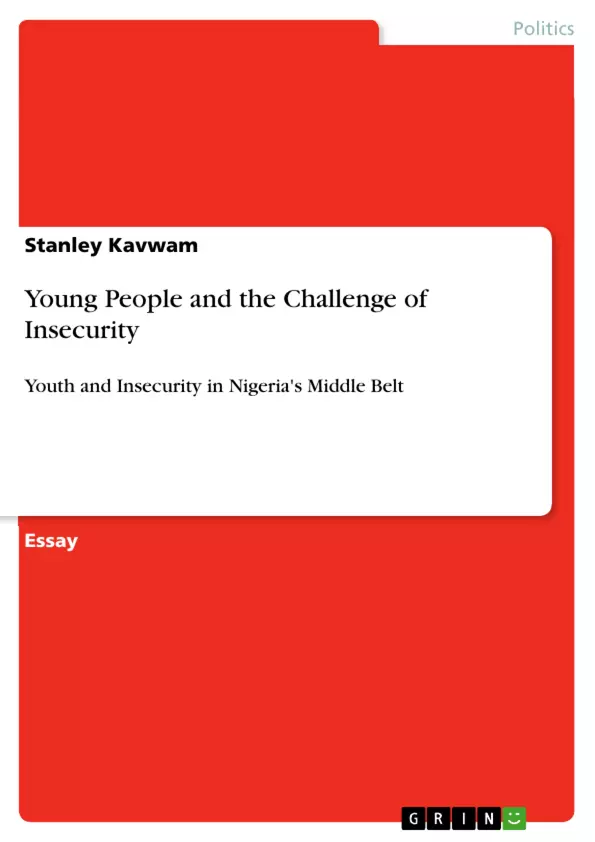This paper x-rays the over a decade intractable conflicts that have ravaged the socio-economic fabric of Jos Plateau State North Central Nigeria and its implications for youth participation in the democratic process. It further lays bare the barriers to national integration among the multifarious nationalities that make up the Nigerian teritory.
Insecurity is a problem common among developed and developing nations that constitute significant threat to peaceful co-existence, interaction, stability and development. It charges people with threats, tensions, anxieties and uncertainties.
At the receiving end of insecurity are sadly youths who are recruited to either fight for a cause not their own or have their educational pursuits abandoned in the wake of these violent conflicts. As a resultant consequence, the supremacy of the constitution which is the ground norm for conduct is interminably jettisoned. Farmers and herdsmen clashes have given a new definition to the dynamics of insecurity on the Plateau. This is manifested in the horrific manner in which villages are razed to rubbles over such disputes. When the constitution fails to hold accountable, perpetrators of heinous crimes owing to favoritism or selective justice, the sanctity of lives are lost. This is the fundamental precursor to youth’s engagement in violent conflicts over the years with the menace of Boko Haram at the zenith of radicalization. As the nature of terrorism assumes an even dangerous dimension owing to significant advancement in technology, the future of our youths leaves a lot to be desired. This is in view of the fact that when youths are not groomed for leadership but rather occupied in destroying the future, the survival of the society beyond this generation becomes bleak and frightening. Arms stockpile and manufactured of IEDs is no longer news as many communities have been devastated by suicide bombings and hundreds of lives lost. One may be tempted to ask whether the government is unaware of these occurrences. When government seemingly tolerates the activities of lawless elements in the society, it inspires other young people to look forward to unleashing mayhem on unsuspecting members of the public with great zeal.
Inhaltsverzeichnis (Table of Contents)
- INTRODUCTION
- YOUTH AND INSECURITY ON THE PLATEAU
- YOUTHS IN SCRAMBLE OVER SCARCE RESOURCES
- BREAKING THE CONUNDRUM OF RELIGIOUS IDENTITY
Zielsetzung und Themenschwerpunkte (Objectives and Key Themes)
This paper aims to examine the challenges of insecurity faced by young people in Plateau State, Nigeria, and explore how changing narratives can contribute to sustainable development. It specifically focuses on the impact of violence on youth, the role of scarce resources in exacerbating tensions, and the dangers of religious extremism.
- The impact of insecurity on youth in Plateau State
- The influence of scarce resources and social inequality on conflict
- The role of religious identity in shaping and perpetuating violence
- The need for a change in narratives to promote sustainable development
- The importance of leadership in addressing insecurity and promoting peace
Zusammenfassung der Kapitel (Chapter Summaries)
- INTRODUCTION: This section introduces the topic of youth and insecurity in Plateau State, highlighting the relevance of the subject in the current context. The author emphasizes the importance of youth participation in shaping a sustainable future.
- YOUTH AND INSECURITY ON THE PLATEAU: This section explores the complex dynamics of insecurity on the Plateau, arguing that it goes beyond religious and ethnic conflicts. It attributes the root causes to inequality, poverty, and the failure of leadership to address these issues effectively. The author also discusses the impact of violence on youth, including their recruitment into armed groups and the disruption of their education.
- YOUTHS IN SCRAMBLE OVER SCARCE RESOURCES: This section examines the role of scarce resources in exacerbating social tensions and fueling conflicts. It argues that perceived injustice and inequality in the distribution of social goods often lead to violence. The author also highlights the dangers of religious involvement in governance, which can be used as a tool for manipulation and violence.
- BREAKING THE CONUNDRUM OF RELIGIOUS IDENTITY: This section explores the issue of religious fanaticism and extremism, arguing that it is a negative and harmful attitude towards religion. The author emphasizes the importance of separating religious and political spheres and promoting a more inclusive understanding of faith. It also criticizes the role of leadership in perpetuating divisive identities and calls for a shift towards a more united and cohesive society.
Schlüsselwörter (Keywords)
The main keywords and focus topics of the text include youth, insecurity, sustainable development, Plateau State, Nigeria, conflict, inequality, scarce resources, religious identity, religious extremism, leadership, and social justice. These terms highlight the primary themes and concepts discussed in the work, including the impact of conflict on young people, the role of social and economic factors in shaping violence, and the importance of promoting a more inclusive and peaceful society.
- Arbeit zitieren
- Stanley Kavwam (Autor:in), 2018, Young People and the Challenge of Insecurity, München, GRIN Verlag, https://www.grin.com/document/388685



